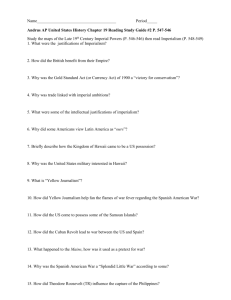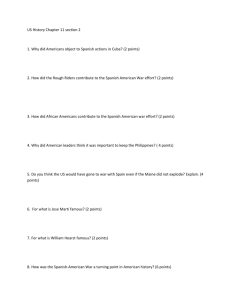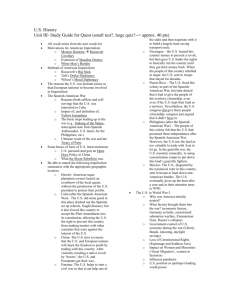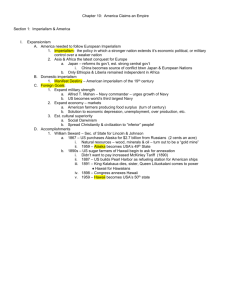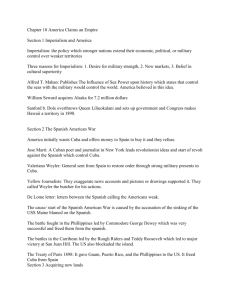Unit 4: Imperialism (4.1-4.2) - Mr. Stelly's Class SiteAmerican
advertisement
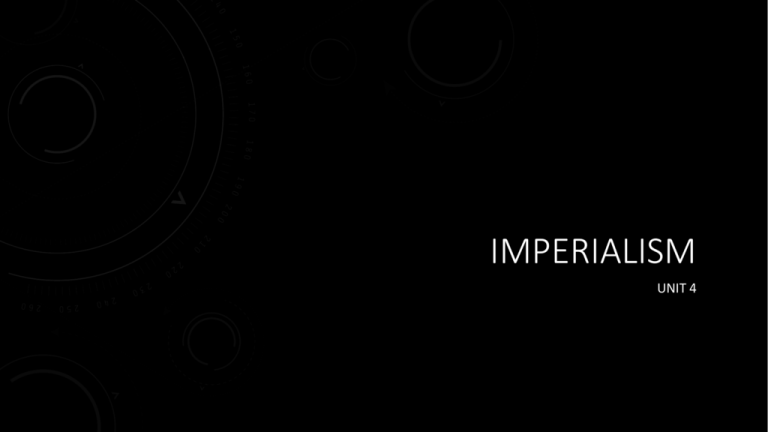
IMPERIALISM UNIT 4 Essential Question: UNIT 4.1 INTRO TO IMPERIALISM • • • • • Imperialism Nationalism Imperialist Powers Alaska Growth of the U.S. Navy How is Imperialism similar or dissimilar to Manifest Destiny? Compare. • • • • • Alfred T. Mahan Hawaii – Why? Hawaii China Japan IMPERIALISM • Empire - an extensive group of states or countries under a single supreme authority NATIONALISM • Imperialism led to nationalism – the belief that one’s country is superior and deserving of admiration • Theory that Social Darwinism proved that Western Nations were culturally superior • Christian Missions – lead to religious tensions in non-Christian Nations IMPERIALIST POWERS • Great Britain • France • Belgium • Germany • Japan ALASKA • Purchased by William Seward (Lincoln’s Sec. of State) from Russia for $7.2m – wanted an American Empire • Known as “Seward’s Ice Box” GROWTH OF THE U.S. NAVY • Alfred T. Mahan – “Sea Power” – Nations with a better Navy have more impact on the world - led U.S. Navy’s shift to steam powered ships HAWAII – WHY? • Great location for a port – access to Asia – can grow sugarcane HAWAII • King Kalakaua - had Treaty with the US – made importation of sugar cheap – planters were very wealthy • Queen Liliuokalani – Overthrown by planters with help of U.S. Marines • Sugar Tycoon – Sanford Dole – Became President of the Republic of Hawaii • Hawaii became a U.S. Territory in 1898 CHINA • Spheres of influence – European powers had internal control over China – introduced trade and business CHINA - CONTINUED • U.S. Sec. of State John Hay – demanded “Open Door Policy” to give all countries equal footing in China • Boxer Rebellion – Chinese angered over Christian influences – European countries helped to end the rebellion - exploitation and control increased JAPAN • Traditional Society – Feudalism – Based on Agriculture • Great White Fleet = U.S. Navy – Japan realized they were behind, tried to catch up – led to an industrial and technological frenzy ESSENTIAL QUESTION • How is Imperialism similar or dissimilar to Manifest Destiny? Compare. UNIT 4.2 SPANISH-AMERICAN WAR • • • • • • Unrest in Cuba S – USS Maine L - De Lome Letter I - Imperialism P - Propaganda - Yellow Journalism War in the Philippines Essential Question: Explain how war with the Spanish affected the United States on the world stage. • • • • • War in Cuba Results of War Annexing the Philippines Controlling Cuba Controlling Puerto Rico UNREST IN CUBA • Cubans revolt against Spanish – Spanish execute rebel leaders • Jose Marti – campaigned in America to gain support for Cuban freedom – killed by Spanish government • Spanish General Valeriano Weyler – Leader in Cuba – ruthless and harsh “Butcher Weyler” • Created “relocation camps” for 300,000 Cubans he trusted S – USS MAINE • Blew up in Havana Harbor (Cuba) – 260 Americans killed • Spain was blamed L – DE LOME LETTER • Spanish Minister Enrique Dupuy De Lome bashed President McKinley • William Randolph Hearst’s newspaper released it – turned sentiment against Spanish I - IMPERIALISM • The act of creating an empire - What is an empire? P – PROPAGANDA – YELLOW JOURNALISM • William Randolph Hearst & Joseph Pulitzer • Exaggerated stories • War = big issue • Big issue = higher newspaper sales • Higher newspaper sales = $$$ • War = $$$ WAR IN THE PHILIPPINES • Manila Bay – Commodore George Dewey defeats Spanish fleet thanks to steel and iron ships • Emilio Aguinaldo led Filipino Rebels on land • Spanish were surrounded on land and by sea - surrendered WAR IN CUBA • U.S. strategy: Control Santiago • Battle of San Juan Hill – Led by Theodore Roosevelt and his “Rough Riders” – American Victory • U.S. Navy sank entire Spanish fleet around Cuba RESULTS • U.S. gains control of Cuba, Puerto Rico, and Guam • U.S. purchases the Philippines for $20m ANNEXING THE PHILIPPINES • Gains: Economic value through trade and exploitation – Strategic value with a port • Problems: Philippines wanted to govern themselves – Nativists didn’t want Filipino immigrants • Annexed: 1899 – Freedom Fighters fought against the US for 3 years • Legislative Rights: 1916 • Full Independence: July 4th, 1946 CONTROLLING CUBA • McKinley set up a military government – Governor of Cuba appointed • Attempted to end yellow fever by eliminating standing water • Cuba drafted a New Constitution • Platt Amendment - made Cuba a US Protectorate CONTROLLING PUERTO RICO • McKinley set up a military government – governed as a territory • Foraker Act of 1900 – U.S. appoints their governor and upper House Legislature – Puerto Rico elects their lower House Legislature • US Citizenship and Full Legislative Powers – 1917 • Self-Governing Commonwealth – 1952 (U.S. still controlled trade, foreign policy, and military) ESSENTIAL QUESTION • Explain how war with the Spanish affected the United States on the world stage.
